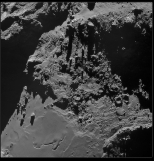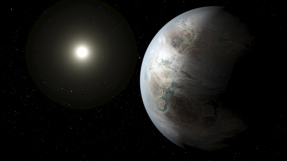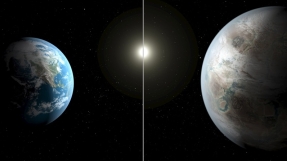
"No one would have believed in the last years of the nineteenth century that this world was being watched keenly and closely by intelligences greater than man's and yet as mortal as his own."
That great opening line is, of course, from HG Wells' The War of the Worlds, and the other world is Mars.
The Red Planet has always fascinated science fiction writers. It's so near, and yet so far. I grew up reading Edgar Rice Burroughs, who called it Barsoom and populated it with near-immortal humans, giant green-skinned warriors and white apes. Hubble may have expanded our knowledge of the universe, but Mars is still our favourite exoplanet: it's the setting for Total Recall (1990 and 2012) and of course who can forget Mars Attacks! (1996)? Matt Damon is to star in another one, The Martian, out in November.
One day we will go there. Now, scientists have found evidence of liquid water on the planet's surface. It is still not a very hospitable place, but if an expedition doesn't need to take water along, it makes the voyage much more straightforward.
The discovery of water also means that the chances of finding life there have risen a bit. Without water, as far as we know, life can't evolve. On the other hand, Mars is bathed in cosmic radiation because it has no global magnetic field to protect it, so any life that did evolve – and we're talking microbes, not mice and definitely not men – would need to be quite a long way underground.
Mars, though, is only one planet. Of all the ones in our solar system it's the most habitable, though that isn't saying much – we'd be fried if we tried Mercury and crushed by Jupiter's gravity before we got near the surface.
Maybe we're alone in the universe. Given its sheer size and scale, that seems unlikely – though if there are other civilisations out there, some of them must be more advanced than us and it's odd that they've never dropped by.

But say we did find life on Mars – or, which is more likely, on another planet. What would it mean for Christian theology? Did Jesus die for all humans, or for all sentient beings everywhere? Was he incarnate only on earth, or has he been incarnated many times?
At the beginning of The War of the Worlds, HG Wells ruminates: "At most terrestrial men fancied there might be other men upon Mars, perhaps inferior to themselves and ready to welcome a missionary enterprise."
If there are other sentient beings out there, do they need salvation? Should HTB start developing an Alpha for Alpha Centaurans, just in case? Or does God have different ways of relating to each world, redeeming each one in its own terms? Sydney Carter, the hymn writer, thought so: in his song Every Star shall Sing a Carol, he wrote:
Who can tell how many crosses,
Still to come or long ago,
Crucify the king of heaven ?
Holy is the name I know.
Who can tell what other cradle
High above the Milky Way
Still may rock the king of heaven
On another Christmas Day ?
Carter (1915-2004) was not a very orthodox Christian. Frederick William Faber (1814-1863), on the other hand, most definitely was: a Victorian High Anglican, he was the author of several hymns that are still sung today, including There's a wideness in God's mercy. One verse that's usually missed out is:
There is grace enough for thousands
Of new worlds as great as this;
There is room for fresh creations
In that upper home of bliss.
Faber, most unusually for his time, was prepared to imagine God's grace overflowing not just in this world, but in the thousands yet to be discovered.
Science fiction writers have explored religious themes, not always very sympathetically. The atheist writer Arthur C Clarke had a story called The Star, in which a group of space explorers return from discovering the remains of an advanced civilisation destroyed by a supernova. One of the group is a Jesuit priest, whose faith is shaken by the knowledge that the supernova was the star that shone when Jesus was born. It ends, "Oh God, there were so many stars you could have used. What was the need to give these people to the fire, that the symbol of their passing might shine above Bethlehem?"
Someone else who took a far more thoughtful and theologically informed line was CS Lewis. His Out of the Silent Planet trilogy contemplates worlds in which there is no sin, and in which God's relationship with his creation is as he intended it to be (the 'Silent Planet' is Earth).
If life on Mars is ever discovered, it won't be anything like what Edgar Rice Burroughs invented. But discovering sentient life elsewhere would be the most extraordinary thing imaginable. So the challenge for our theologians would be how to fit that discovery of new life-forms, in all probability different beyond our capacity to fathom, into our understanding of what God has done in one corner of a small planet which is one of millions in a universe vast beyond comprehension.
What might help them to begin are the words of Psalm 8, where the Psalmist looks up at the night skies and is awed into silence by the scale and grandeur of the stars. Instead of being crushed by the thought of his insignificance, though, he is elevated by the knowledge of God's care for him:
When I consider your heavens,
the work of your fingers,
the moon and the stars,
which you have set in place,
what is mankind that you are mindful of them,
human beings that you care for them?
You have made them a little lower than the angels
and crowned them with glory and honour (3-5, NIV).
Even so vast a universe is still held in the palm of God's hand.
Follow @RevMarkWoods on Twitter.













